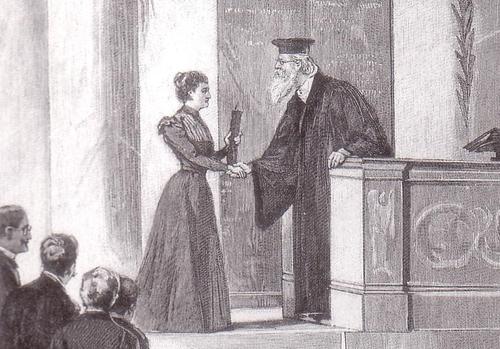Who was Elsa Neumann?
Elsa Neumann was the first woman to receive a doctoral degree from Berlin's Friedrich-Wilhelms-Universitaet. At a time when women were denied official access to university education in Prussia, she defended her dissertation in the field of electrophysics. In addition, she founded a non-profit association to support female students. Since 2010, the scholarship for young academics in Berlin has been named in honor of Elsa Neumann.
Elsa Neumann was born in Berlin in 1872 as the daughter of a Jewish banker. Her family's wealthy situation enabled her to receive comprehensive education at girls' schools, and private lessons. In Prussia, and therefore also in the Prussian capital Berlin - girls were denied the regular route to obtaining their Abitur, the diploma that officially qualified them to pursue higher education. Women were also not allowed to enroll as students at the country's universities. They were only allowed to attend courses at universities through special permits from the Ministry of Culture and with the consent of professors.
With such an exemption, Elsa Neumann studied at the Friedrich Wilhelm University in Berlin (today Humboldt University). There, she was particularly supported by mathematics professor Immanuel Lazarus Fuchs and the physicists Emil Warburg and Max Planck. Although the mood among university professors at that time was generally skeptical about women's studies, they were nevertheless willing to make individual exceptions and teach suitable female students in their courses. Elsa Neumann was such an exceptional talent.
The intercession of her professors finally allowed Elsa Neumann to officially complete her studies. Thanks to an exemption from the Prussian Ministry of Culture, she received her doctorate in 1898 with a dissertation “On the polarization capacity of reversible electrodes”. Even before completing the doctoral process, she was the first woman to be accepted into the Physical Society. Her award ceremony in February 1899 became a social event: A contemporary engraving shows the mathematician Hermann Amandus Schwarz, dean of the Faculty of Philosophy, presenting the doctoral certificate to a young woman in a dark dress. The hall is filled with curious spectators. Berlin daily newspapers reported extensively and praised the courage of both the doctoral candidate and the progressive educational institutions.
Only four years prior, in 1895, the first women were allowed to attend Berlin universities. And only 10 years after Elsa Neumann's doctorate, in the summer of 1908, women gained the right to regularly enroll at Prussian universities. During these 10 years, 21 more women completed a doctorate at the Berlin Philosophical Faculty, all with special permission from the Ministry of Culture.
Elsa Neumann was well aware of her role as a pioneer for women's right to education: her origins from a wealthy family had given her educational opportunities that were denied to many other women. The implementation of women's studies therefore also had to be supported economically. Together with like-minded people - men and women – Elsa Neumann founded the “Association for the Granting of Interest-Free Loans to Studying Women” in April 1900. She became the first chairwoman and later an honorary member of the association.
Despite her supporters and media attention, the young graduate's career prospects were limited: as a woman, Elsa Neumann would not have been able to get a job at a university (yet), and as a teacher at a state school, she would not have been hired as a Jew. Her only option was to conduct research in a private laboratory, of which there were several in Berlin at the time. Elsa Neumann rented her own workspace there, researched questions of electrochemistry and became a member of the German Chemical Society. Among other things, she conducted research on behalf of the German Airship Association. At the end of June 1902, she even took part in a trip on an airship.
Just a month later, in July 1902, Elsa Neumann was killed in a laboratory accident. She died as a result of hydrogen cyanide poisoning, whether due to carelessness or a technical defect in the air vent remained unclear. Obituaries in the journals of the Physical and Chemical Society attest to their recognition among academic colleagues. After her death, her mother founded the “Elsa Neumann Prize” for the best mathematical or physics work of a year, which was expressly to be awarded regardless of gender or religion. Social circumstances were responsible for the fact that the prize nonetheless was never awarded to a woman. Nor did the designated sum survive inflation in Germany after 1918. When the National Socialists came to power, the memory of Elsa Neumann, as well as the entire network of Jewish scientists, was erased in Germany.
To revive the memory of Els Neumann and her acheivements in Berlins scientific community, the Berlin Senate decided to name his funding program for young scientists after her in 2010.

